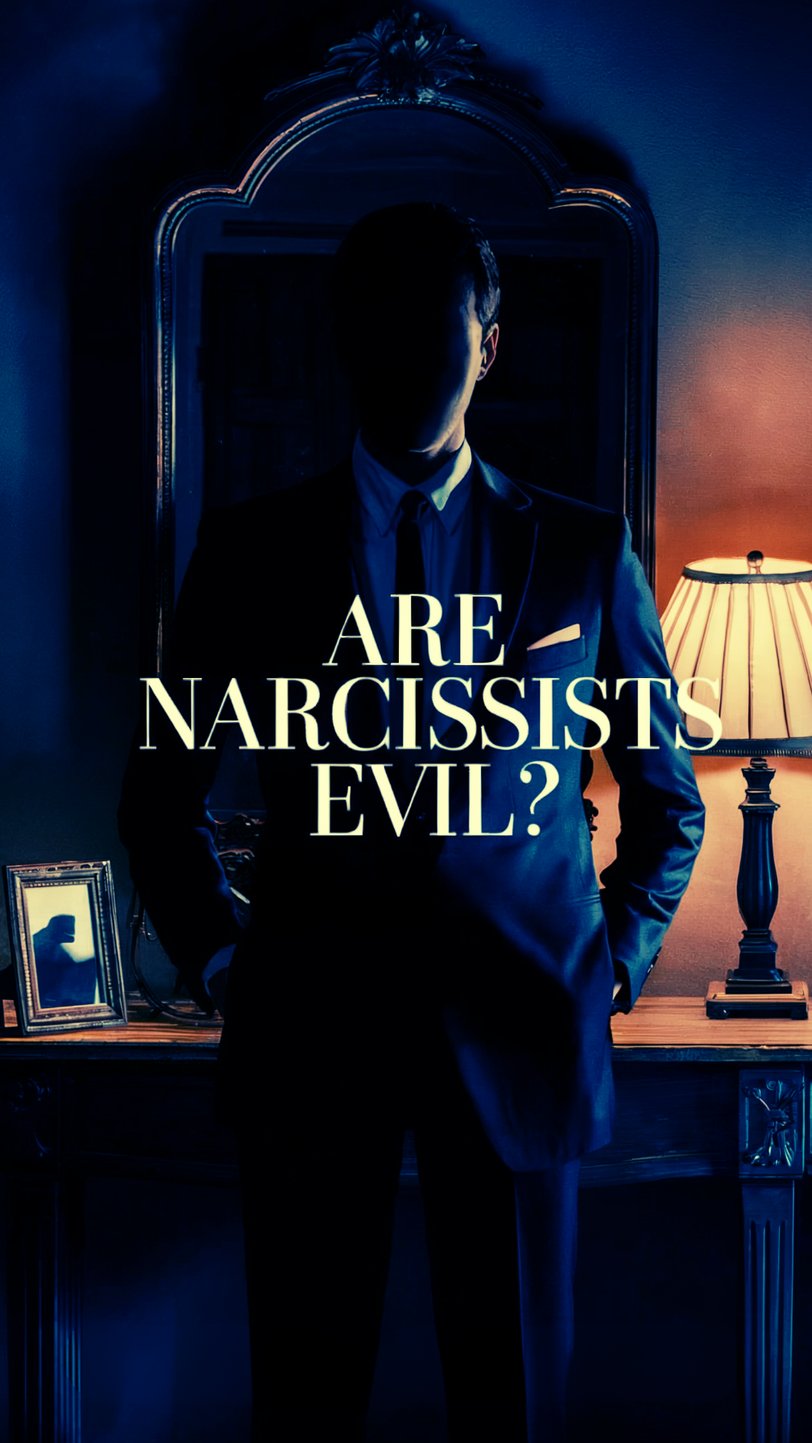Are Narcissists Evil?
Are narcissists evil? Explore their intent, damage, and impact with expert insights, case studies, and recovery tips. Reclaim clarity and control today!
Abuse No More
6 min read


Are Narcissists Evil?
Have you ever looked into the eyes of a narcissist and felt a chill, like you were peering into a bottomless pit? Or maybe you’ve just caught yourself wondering, Can someone really be that heartless? It’s a question as old as psychology itself: Are narcissists evil?
Now, this isn’t just about asking if they’re a little selfish or if they made a mistake in their personal relationships. We’re talking about that gut-wrenching, reality-shaking realization of how far their manipulations can go—about the intentional harm they seem to inflict without a trace of remorse. When you’ve been burned by a narcissist, it’s hard not to ask if you were ever dealing with a human at all.
Let’s dig into the psychology and ethics of this question, taking it apart with cold, hard facts, a few case studies, some celebrity examples, and a healthy dose of perspective.
The Nature of Narcissism: Is It Really "Evil"?
First, we’ve got to ground this in something concrete. In psychology, narcissism isn't classified as “evil.” But that doesn’t mean it doesn’t look, feel, or sometimes act like it. Narcissistic Personality Disorder (NPD) sits firmly within the realm of personality disorders, classified by patterns of arrogance, need for admiration, lack of empathy, and a serious inability to handle criticism. But is this truly malevolent or more like a mental and emotional deficiency? Think of it like this: Where some people lack self-control or the ability to empathize, a narcissist’s Achilles heel is their need to dominate, control, and stay on top—no matter the cost.
Most experts agree that narcissists don’t see their behaviors as harmful because they’re trapped in a distorted view of the world, one where they’re the only real person, and everyone else is just a supporting cast. But does this really let them off the hook? Absolutely not.
Being self-centered doesn’t excuse hurting others. It doesn’t erase the trauma they leave behind, nor does it explain away the chaos they deliberately cause. Narcissists know they’re hurting people—they’re just okay with it if it gets them what they want. That, right there, gets us into murky waters.
Case Study 1: The "Family Destroyer" - A Cold, Calculated Betrayal
Imagine a mother who subtly manipulates her children, pitting them against each other to ensure they all remain loyal to her alone. She does this to maintain control, demanding loyalty by eroding their trust in each other. This narcissist knows what she’s doing; she’s witnessed the fallout and pain it causes, yet she doesn’t stop. For her, the end justifies the means.
Does this qualify as evil? On one hand, she’s technically using her children to satisfy her need for validation, but on the other, she’s fully aware of the pain she’s inflicting and does it anyway. The harm is calculated, premeditated, and sustained over time. Here, we can’t chalk it up to simple ignorance—this kind of manipulation crosses into a morally corrupt landscape.
Evil or Humanly Flawed? Understanding Intent and Responsibility
Evil, as a concept, implies intent to harm—an inherent malevolence. Most narcissists don’t fit this mold; they’re not typically out to hurt people for the sake of hurting them. But here’s where it gets tricky: when they become aware that their actions cause pain and keep doing it anyway, where does that leave us?
A common defense of narcissists is that they lack the emotional capacity to understand or care about the consequences of their actions, that they operate from a place of deep insecurity or unprocessed trauma. But even if someone has trauma, once they’re adults with enough feedback from those they’ve hurt, shouldn’t they be held accountable?
The question then becomes not just are they evil but how responsible are they for their actions? You see, lack of empathy may limit one’s understanding of others’ feelings, but it doesn’t eliminate accountability.
Celebrity Examples: The Cold Calculations of Hollywood Narcissists
Let's get real—Hollywood is packed with narcissistic personalities who demonstrate, on a public scale, just how deep narcissism can run. From the stars who cut down their co-stars and manipulate fans, to executives known for Machiavellian deals, these public figures have created whole worlds centered around their own image. They may not see themselves as bad people, but they’ve perfected the art of playing with people’s lives like pawns on a chessboard.
Look at figures like Harvey Weinstein. Here’s a man who used his power and influence to manipulate, harass, and outright ruin lives, all under the guise of “business.” His actions weren’t just about winning or being the best in the industry—they were calculated abuses of power designed to keep people in line. Is this evil? To the people he harmed, the answer is crystal clear.
Is There Redemption for Narcissists?
The big question that lingers over this whole discussion is whether narcissists can change, and if so, does that absolve them of what they've done? Here’s where we see some shades of gray.
Most psychologists agree that meaningful change in narcissists is incredibly difficult to achieve, especially because they rarely believe anything is wrong with them. They lack self-awareness and usually seek therapy only if forced to by circumstances or if they hit rock bottom. Even then, progress is slow, and real empathy is nearly impossible to instill in adulthood.
In rare cases, some narcissists do change their behavior, often through years of consistent therapy, with relentless accountability for every manipulative tendency. But here’s the catch: changing behavior doesn’t change the harm they’ve already done. Narcissists who truly want to reform have to face the devastation they’ve caused—and most can’t bear the thought.
So, Are They Evil?
If we’re honest, narcissists exist on a spectrum. Some might be unaware of the true harm they cause and could be more misguided than malicious. But others... let’s just say that if it looks like a duck, quacks like a duck, and consistently destroys lives with no sign of remorse, it may just be evil. True evil, in the end, isn’t defined by a lack of empathy but by an unrepentant disregard for others’ well-being.
The term “evil” carries a weight that people reserve for the darkest actions in humanity. In this case, narcissism may not be synonymous with evil, but it sure can come close in certain forms. Many narcissists, particularly those with a hint of sadism or sociopathy, flirt with the borders of what we’d call “evil,” taking pleasure in control and cruelty as a means to their own ends. For those individuals, their actions speak louder than any psychological theory.
Final Thoughts: What We Can Do
While labeling narcissists as “evil” might offer a kind of emotional relief or closure, it’s crucial for survivors to remember this: the label doesn’t matter as much as the healing. Whether we call them “evil” or just “damaged,” the impact on our lives is the same. Our focus has to be on how we identify, minimize, and control their influence over us.
Understanding the damage without excusing it, naming the harm without forgiving it, and learning how to spot these behaviors before they infiltrate our lives is what empowerment is all about. Whether or not they’re evil isn’t our responsibility—their impact, however, is.
If you're facing the effects of a narcissist in your life and need immediate support or insight, we've got you covered. Visit our Free Resources Page to explore a wealth of guidance designed to empower you on your healing journey. Whether you're looking for practical steps, insights, or just a place to start, these resources are here for you, free of charge, to help you reclaim control.
Explore Our Free Resources and start taking those first steps toward freedom and clarity!


IMC Method Bonus: Taking Back Control
The Abuse No More IMC Method—Identify, Minimize, Control—empowers you to regain your power and thrive. Here's how to apply it:
1. Identify
Recognize the narcissist’s toxic patterns:
Manipulation: Gaslighting or guilt-tripping you into compliance.
Exploitation: Taking advantage of your kindness or achievements.
Dismissiveness: Downplaying your concerns or emotions.
Action Step: Document instances of these behaviors to gain clarity and break through the fog of manipulation.
2. Minimize
Reduce the narcissist’s impact by limiting their access to your emotions:
Establish boundaries and enforce them consistently.
Minimize contact when direct confrontation isn’t possible.
Focus on self-care practices to build resilience.
Action Step: Use low-contact or no-contact strategies to shield your emotional health.
3. Control
Take charge of your reactions and prioritize your well-being:
Control your narrative by reframing your experiences and seeking professional guidance.
Focus on relationships that uplift and validate you, leaving toxic connections behind.
Action Step: Practice mindfulness techniques, such as journaling or meditation, to center yourself and reclaim your sense of control.
